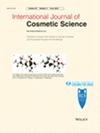Cosmetic emulsions containing innovative complex coacervates: A cross-sectional study
Abstract
Objective
Vitamin E, in the form of α-tocopherol (TOCO), is an essential lipophilic antioxidant widely used in topical formulations. However, incorporating pure TOCO into skincare products poses significant challenges due to its limited solubility and high sensitivity to heat, light and oxidation. The present cross-sectional study aimed to innovate by encapsulating TOCO using non-animal sustainable biopolymers through complex coacervation and to investigate the interaction of these coacervates with cosmetic emulsions, focusing on their impact on the emulsions' physicochemical properties and stability.
Methods
TOCO was encapsulated using the complex coacervation technique by combining two biopolymers: fungal chitosan and gum Arabic. The designed microcapsules were incorporated into oil-in-water emulsions containing natural ingredients, and the physicochemical properties as well as the stability of the formulations were evaluated and compared to those of non-encapsulated TOCO emulsions.
Results
Innovative coacervates of the non-animal TOCO complex of 86.8 ± 3.5 μm were developed, achieving a high encapsulation efficiency and loading of 87.0% and 27.2%, respectively. The microcapsules exhibited thermal stability up to a temperature of 220°C and showed improved storage stability of the active ingredient when encapsulated. In particular, 63% of TOCO was retained over 2 months at a temperature of 40°C. Emulsions containing microcapsules showed increased particle size distribution, higher viscosity, and enhanced viscoelastic properties, in accordance with their textural properties. Both emulsions remained stable for a 1-month storage period at a temperature of 40°C, and no noticeable effect of coacervates on the stability of TOCO in the emulsions was observed.
Conclusion
This study emphasises the potential of fungal chitosan-gum Arabic coacervates as a sustainable substitute for animal-derived coacervates, demonstrating promising outcomes for the encapsulation of lipophilic actives. When incorporated into cosmetic emulsions, these coacervates enhanced the textural and rheological properties while preserving the TOCO stability over time. These findings suggest that the developed microcapsules offer considerable potential for the development of future skin-care products with enhanced functional properties.


 求助内容:
求助内容: 应助结果提醒方式:
应助结果提醒方式:


